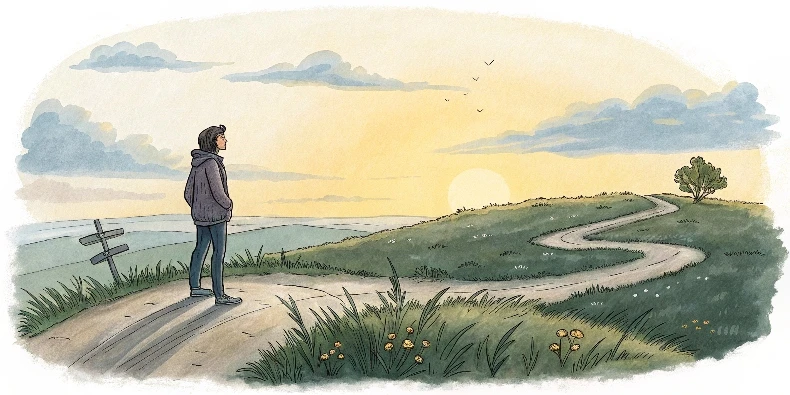Discovering a path that truly resonates with you is a crucial step toward living a conscious and fulfilling life. When we engage in something meaningful, we gain energy, clarity, and inner resilience. But how do you find your true calling in a world full of loud advice and external expectations? How do you recognize the road that’s yours? This article explores what it really means to “find your calling” — and how to move in that direction without unnecessary pressure.
Your calling is not destiny — it’s a conscious choice
Understanding what your calling is isn’t about a magical revelation — it’s about self-awareness and honest introspection. It’s a journey of gradually discovering what truly resonates with you.
To begin the search for your calling, don’t focus on finding the “right” answer. Instead, start with a few honest questions:
- Where do I really want to go?
- What truly matters to me?
- What gives me a sense of meaning and inspiration?
A calling can manifest in many forms — a profession, a creative pursuit, faith, helping others, the pursuit of knowledge, or simply being present and supportive. What matters most is not the form it takes, but how well it aligns with your values and way of life.
How the path to your true work begins
This path doesn’t come with a step-by-step GPS — it begins with recognizing where you are already headed, and whether that direction is truly yours. The first question — “Where am I going?” — can bring surprising clarity.
Don’t try to grasp everything at once. It’s better to choose one direction and move forward, step by step. It’s important to choose something you’re genuinely interested in. If you rely solely on logic or external rewards, your motivation will eventually burn out. But a path that begins with an inner spark can sustain you — even during hard times.
Remember: your chosen path isn’t a sentence. You have the right to change direction, experiment, make mistakes, and rethink things. What matters is starting from what speaks to your heart.
Don’t let other people’s expectations drown out your own voice. Sometimes, even the smallest “I want to…” can become your most reliable guide. It’s not a final decision — it’s simply the first step.
Areas of life where you can fulfill yourself
Understanding who you want to become and which path to pursue is a vital step toward self-realization. It’s not always about a “higher calling”, but rather about finding something you love — something that brings you joy and gives your life meaning.

You can fulfill your potential in many different ways — through your profession, creativity, helping others, or spiritual growth. Below is a brief overview of the key areas where you can discover your calling and feel truly in your element.
| Area of life | Ways to fulfill yourself |
|---|---|
| Professional development | Mastering a profession, mentoring, launching your own business |
| Faith and spirituality | Mindful inner work, living by moral principles, serving others |
| Conscience and personal values | Living in alignment with yourself, practicing honesty, building a personal code |
| Science and knowledge | Analyzing, learning, problem-solving, contributing to shared understanding |
| Business | Creating value, managing projects, bringing ideas and initiatives to life |
| Art | Self-expression, influencing others through visual and meaningful work |
| Wealth and experience | Exploring new experiences, unlocking potential through freedom of choice |
| Helping others | Social initiatives, volunteering, teaching, offering support |
Professional career
Starting a career isn’t easy — things often seem unclear, and confidence may be lacking. But it’s through overcoming those early challenges that your journey toward professionalism begins. The focus should not only be on income but also on learning, skill-building, and gaining experience. The more you know, the more confident and free you’ll feel in your chosen field.
This can later lead to:
- self-employment,
- starting your own business,
- becoming a mentor,
- working in a major company.
The most important thing is to choose a direction that genuinely interests you.
Faith and inner spirituality
For many people, the journey starts with faith — not necessarily religious, but internal and personal. Faith provides an anchor in difficult times and teaches acceptance — not passive resignation, but conscious awareness.
You might see signs and directions in life, but how you respond is your responsibility. Remember: the path to God or your inner center is not about withdrawal from life — it’s about acting with respect for yourself, for life, and for others.
Living by conscience and inner principles
Developing a strong moral core may not be trendy, but it’s a profoundly powerful strategy. It means living in a way that doesn’t betray your true self or go against your deepest values. Honor, sincerity, and integrity are not clichés — they are the foundation for building relationships, careers, and self-respect.
Science and knowledge
If you’re drawn to analysis, structure, and the search for meaning, a scientific mindset might be your path. This doesn’t necessarily mean working in a lab — it’s about thinking critically, asking questions, and exploring.
Science helps you:
- identify patterns in the world,
- understand how life and society work,
- form your own system of meaning.
A modern approach to knowledge blends logic, psychology, and philosophy, offering a deeper perspective on life.
Business and entrepreneurship
If the idea of creating something of your own excites you, entrepreneurship can be a powerful outlet for your potential. It’s not just about money — it’s about freedom, initiative, impact, and personal growth.
Start small: offer your services, gain experience, learn to manage and lead. A true entrepreneur is someone who thinks strategically, can withstand pressure, and grows every single day.
Art
Art isn’t limited to paintings or theater — it’s about expressing what’s inside. If you’re drawn to visual thinking, emotion, and the idea of leaving a mark, try creating. What matters most in art isn’t technique — it’s the meaning behind what you make.
This might be:
- drawing,
- music,
- writing,
- photography,
- design,
- performance.
Creativity helps restore emotional balance, make sense of experiences, and share something meaningful with the world.
Wealth and experience
Pursuing material goals is perfectly valid. But often, behind the pursuit of wealth lies something deeper — freedom, joy, and new experiences. Finding purpose in financial growth isn’t about greed — it’s about fulfilling your desires.
Ask yourself:
- What kind of experiences and opportunities do I want to have?
- How would my life change if I were financially secure?
By answering these questions, you’ll better understand where to go — and why.
Helping others
Many people discover their purpose through service. It doesn’t have to mean volunteering — you can share knowledge, offer support, make life easier for others — and that alone is valuable.
Ask yourself:
- How can I be useful to others?
- Through support?
- Through advice?
- Through action?
- Through energy?
Helping others strengthens self-confidence and builds meaningful connections. And it’s one of the most sustainable and fulfilling paths to self-realization.
What do you live for?
Pause for a moment and ask yourself: what truly inspires you? What makes you wake up with curiosity, move forward, try new things, and keep learning? To discover your calling, you need to ask yourself simple yet profound questions:
- What do I love doing so much that I lose track of time?
- What activities give me a sense of meaning?
- What comes naturally to me — what do I do effortlessly?
- What would I gladly do even if I didn’t get paid for it?
The answers to these questions will help you understand where to look for your true passion — and with it, a sense of grounding and direction in life.
Choose a field where you want to grow. It might be work, creativity, relationships, spirituality, or making a contribution to society — anything that resonates with you. The key is to start with what genuinely interests you, not what’s been imposed from the outside.
Then take an honest look at yourself: To what extent do your current habits, beliefs, and lifestyle align with that chosen direction? What inner attitudes are supporting you — and which ones are holding you back?
You might need to let go of outdated behavior patterns, reevaluate your priorities, or simply step out of your comfort zone. And that’s okay. A calling isn’t a fixed point on a map — it’s a journey that begins with an honest conversation with yourself.
Change isn’t scary. What’s scary is staying stuck when your soul is asking for movement.
How to find your calling in 10 steps

Figuring out how to find your true calling isn’t easy—especially when you don’t know where to start. Ask yourself a few direct questions:
- How much do I enjoy what I’m currently doing?
- Do I feel genuine interest and joy in my work?
- Am I inspired by what I dedicate my time and energy to?
If it’s hard to answer these with a confident “yes”, it might be time to listen to yourself more closely. Here are 10 steps that can help you along the way.
| Step | What to do |
|---|---|
| 1 | Pay attention to your interests and passions |
| 2 | Recall what fascinated you in childhood |
| 3 | Don’t fixate on “one big purpose” |
| 4 | Notice how you feel while doing different activities |
| 5 | Observe what you keep coming back to |
| 6 | Break the routine — change your environment |
| 7 | Try new things without fear of failure |
| 8 | Say “yes” to unexpected opportunities |
| 9 | Don’t live by others’ expectations |
| 10 | Give yourself time and be patient |
1. Pay attention to what truly captivates you
What keeps catching your attention—documentaries about space, posts on psychology, doodling in your notebook margins? Don’t ignore these signals—they’re clues to your inner interests.
2. Remember what you loved as a child
What fascinated you in school? What did you play or dream about? Many of the things we loved in childhood can be keys to discovering our deeper purpose.
3. Don’t get stuck on the “Big future” idea
The thought “I need to find my life’s work” can feel overwhelming. Instead, ask yourself a simpler question: What do I feel like trying right now?
4. Listen to how you feel in the process
The right path often feels like being “in the right place at the right time.” If you feel bored or irritated, it’s likely not yours—and that’s valuable to know, too.
5. Notice what you keep coming back to
If you keep rewatching travel documentaries or find yourself returning to cooking again and again—pay attention. We all have things that persistently call to us.
6. Change your environment
Routine stifles creative thinking. Sometimes, simply taking a new route to work or going on a solo trip can spark fresh ideas.
7. Experiment without fear
Want to try pottery, parkour, or writing a short story? Go for it. Even if it’s not your thing, every attempt brings you closer to what truly resonates.
8. Say “Yes” to new opportunities
Say yes to that theater outing, the workshop your coworker invited you to, or that art exhibit you don’t understand. New paths often open by chance.
9. Don’t live by others’ expectations
If someone insists who you should become but it doesn’t feel right—don’t be afraid to take your own path. Finding your calling means being honest about what you want, not what others expect.
10. Be patient
Your calling rarely arrives as a sudden revelation. It’s not an instant insight, but a journey of trial, error, and self-inquiry. Move toward it slowly, with an open heart—the reward is a life filled with meaning.
What’s next?

Finding your calling isn’t about making one perfect choice for the rest of your life. It’s a process—one that begins with honest questions and continues through trial, error, and unexpected discoveries. Sometimes, the path to meaningful work isn’t linear—and that’s completely okay.
The most important thing is not to compare yourself to others or be afraid to move at your own pace. Listen to yourself, try things, make mistakes, and try again—this is how your own path begins to take shape.
And even if you don’t yet know where it’s leading, this is already the beginning of something real.



